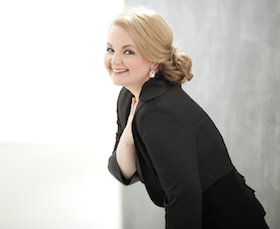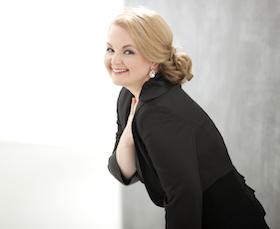
San Francisco Opera audiences have twice had the opportunity to enjoy the rich mezzo-soprano of Elizabeth DeShong: first in her company debut as the Page in Salome in 2009, and more recently in the trouser role of Maffio Orsini in Lucrezia Borgia in 2011. The native of central Pennsylvania currently lives near her husband’s family in Akron, Ohio, though, like many singers in great demand, most of her year is spent on the road. Currently, she is in town for her third role with SFO, as Suzuki in Madama Butterfly, which she will sing opposite Patricia Racette’s Cio-Cio San June 15–July 9.
Earlier this year, she sang the role with the Metropolitan Opera, garnering stellar reviews such as this one in The New York Times: “The mezzo Elizabeth DeShong was outstanding as Butterfly’s servant Suzuki. With her deeply resonant low register, she created a character who is tragically prescient about the unfolding disaster.”
Our discussion began with the topic of her early training, especially with regard to the aforementioned “deeply resonant” lower register.
You’ve said that you always knew you were a mezzo (as opposed to a contralto).
The color was always present in my voice, the mezzo quality that I have, the warmth. So my early teachers recognized that and they said, “You’re definitely a mezzo-soprano.” Sometimes people said contralto. I had wonderful teachers who taught me not to just luxuriate in the sound in the lower portion of my voice. I did get repertoire early on that just used that facility because it was perhaps a little more rare in singers that were in college or training programs, so I think initially that part of my voice was nurtured more. Then as I grew and went to grad school, my teachers always said, “A good mezzo has a good high C.” And I’m a determined and competitive person with myself and I said, 'Well, if a good mezzo has a good high C, I’ve got to have one of those. I’m sure I have one in there somewhere!' And sure enough, it was there. I just had to give myself permission to access it and then link it up with what was strong at the bottom.
So with Daune Mahy at Oberlin and Marlena Malas at Juilliard, together with what they both brought me, we worked on a seamless transition between what was strong at the bottom with what was becoming strong and is now strong at the top. I’ve worked to keep those healthy and balancing each other.
You’ve said about doing trouser roles, “Gender is less important than one might think.” Where did you pick up what you know about acting?
I can’t say that there’s one particular source where I got my acting ability or intuition. I do feel it comes down to intuition and trusting your intuition and being a good listener. As far as gender and “pants roles,” if you focus too much on gender, then a character falls into a sort of stereotype — an approximation of something that we don’t feel. If we just feel what the character wants and its relationship, it isn’t a gender issue. Love is love. Sadness is sadness. And it comes out in whatever way it needs to, based on the situation you’re in. I really don’t think altering your walk or … that will happen as you inhabit your characters more, but I think being in touch with their emotions will lead you to the right space.
Singers seem to specialize so much these days, but your repertoire seems diverse: Wagner, Puccini, Rossini, Handel. Are you doing that on purpose to stay healthy?
One hundred percent yes. Because of my facility with the coloratura, the flexibility that does come naturally to me, I didn’t have to specifically hone that. So I was a little bit afraid, in a way, of being plucked into just a Rossini zone, which is a wonderful zone to be in. But there’s more there. There’s more that I feel I can do and say with the color, the facility that I have. So it is a decision. It is a choice to keep my repertoire varied.
I’m focused now on bel canto. I don’t want to move too soon into heavier rep, although there is more Verdi in my future. I believe it was Daune Mahy — it might have been Marlena Malas — but they both put into my mind to sing as young as possible as long as possible, and I aim to do that. I want to keep the voice flexible. I don’t want to turn any corners that I can’t come back from, vocally. And there’s plenty of time for all of those things. I’m focusing on Rossini, Bellini, Donizetti. That’s where I’m living right now, but there’s more to come to keep it varied.
Let’s talk about [the role of] Suzuki. You’ve said that you’re used to seeing Suzuki played as an older, almost maternal, character and that when you did the role at the Met, you and the director chose to make her more of a slightly older sister. How are you and director Leslie Swackhamer approaching the character in this production for San Francisco?
There’s more that I feel I can do and say with the color, the facility that I have. So it is a decision. It is a choice to keep my repertoire varied.
We have thought of her as about 30, so if Butterfly is 15, she’s 30. She has double the experience. She’s a friend, always a friend, and a mentor. Not a parent.
Her fidelity is remarkable. When everyone else has abandoned Butterfly, Suzuki is so true. Why?
I have a couple of different back stories ... Sometimes I feel that maybe she herself was a child left behind, maybe she herself was like Sorrow is. [Butterfly’s illegitimate son in the opera is named “Dolore,” or “Sorrow.”] Maybe she was that child so she’s more drawn into the situation. She has more that she wants to support and sustain. She has that knowledge of “men come here, they take advantage of women who need things, who need love, who want to believe in something real, and then they leave people behind.” In that scenario, she just wants to support that person — a figure, maybe, like her mother. I think that gives depth to the character. Or perhaps she’s just loved and lost and she hates to see that happen to someone.
Do you have a favorite moment in the opera in terms of how revealing you feel it is about Suzuki?
Yeah, actually, and it’s a moment, maybe, that isn’t initially obvious. In Act 3 towards the end, when Butterfly has stumbled upon the scene of Pinkerton’s wife and she’s asking if he’s been there. She comes to Suzuki and she says, “You, Suzuki, my tried and true loyal friend,” and she asks if he’s been there. And for me, I always shake my head a slight “no” there. With Suzuki, she always wants to give more. It’s like, “No, I haven’t given enough. I should have spoken sooner. I let my heritage or what I felt was right keep me quiet. I should have said in the beginning when I had doubts.” I think it’s in that moment that you know who Suzuki is, and it’s a moment that can be missed. But I think that’s where she lives. That’s where Suzuki’s heart is. “I should have done more. I should have prevented this.”
Speaking of caring deeply and wanting to make things better, you’ve said that you’re likely to be found with a petition in your inbox. What would you like to say about one of your favorite causes?
I think with this job of opera singer or artist … it’s about connecting with people and sharing experience, empathizing with your characters, and bringing out emotional situations.
I think with this job of opera singer or artist, or whatever you want to call it, it’s about connecting with people and sharing experience, empathizing with your characters, and bringing out emotional situations. I think to bring that to the stage it’s important to show that off the stage. You have to nurture yourself and the environment around you. The causes I’m drawn to speak for those who can’t speak for themselves. That often is animals or the environment. A lot with marine mammals, the Dolphin Project, and various projects. I like to give to the small things. I posted today on my Facebook page about a family who adopted a boy who suffered severe abuse in his home. He’s in hospice care and my mother works for hospice care. [I like to go] into the corners — the issues that don’t become issues that you need to reach out and find, where your money and energies can go directly to the source. I don’t know, it’s hard to pick just one. There are so many things and people in need.
That makes me think of the role of the singer, in general, as giving voice to others. A performer, a singer, an actress is expressing emotions that the audience has but doesn’t necessarily express.
Exactly, and that’s especially true of Suzuki. I view Suzuki as a mirror to the audience. She’s privy to most, if not all, depending on the production, of the information that causes concern in the audience. And, like the audience, she has to stay quiet because of her circumstance. She only gets the luxury later to say what we’ve all been wanting to say all along: “I saw this coming; this is going to kill her.” I think that helps the audience relate to her because they can see her expressing all the things they want to.
You said Verdi is down the road, and you have your high Cs, so maybe someday we can hear your Amneris [in Aida]?
I would think there’s a strong possibility of that.
You have a series of photos that you post online that you call the “Singer’s Suitcase.” What do you love the most about this singer’s life on the road, and what do you not love?
I think being on the road, in some ways, drew me to this profession. Growing up in a small town in central Pennsylvania, I look back now and appreciate it, but at the time, I wanted to see more. I wanted to go more places. I wanted a job and a lifestyle that could provide that. So I love the travel. That’s not to say that it doesn’t have its drawbacks. You miss your comforts at home, and it poses special challenges in relationships and family. Everybody finds their own balance with it, but so far I’m loving it.
You’ve said that people should take bets on how soon you’ll be talking to a real estate agent out here because you love San Francisco so much. Have you talked with a real estate agent yet?
[Laughs] No, but I’m always perusing Trulia and Zillow when I’m out here because I feel so at home. I’m fortunate. I stay with my best friend from middle school through high school who now lives here in Oakland and teaches [instrumental music] in the Piedmont School District. I stay with her when I’m here, so I feel, in a way, that I already have a home here. But I’m always tempted by the sunshine. It would be nice to return to, those times that I’m home.

